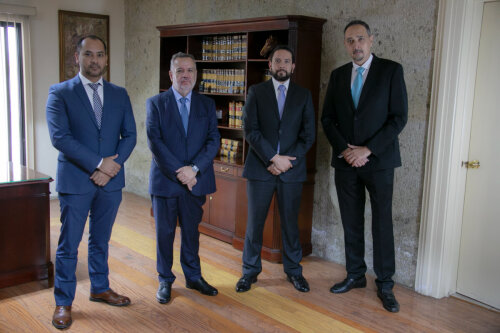Best Defamation Lawyers in Puerto Vallarta
Share your needs with us, get contacted by law firms.
Free. Takes 2 min.
List of the best lawyers in Puerto Vallarta, Mexico
About Defamation Law in Puerto Vallarta, Mexico:
Defamation in Puerto Vallarta, Mexico refers to the act of making false statements about someone that harms their reputation. This can include both spoken (slander) and written (libel) statements.
Why You May Need a Lawyer:
You may need a lawyer for Defamation in Puerto Vallarta, Mexico if you have been falsely accused of making defamatory statements or if you have been the victim of defamation. A lawyer can help you navigate the legal process and protect your rights.
Local Laws Overview:
In Puerto Vallarta, Mexico, defamation is considered a civil offense rather than a criminal offense. The burden of proof lies with the plaintiff to show that the statements made were false and caused harm to their reputation. Punitive damages may be awarded in some cases.
Frequently Asked Questions:
Q: What is the difference between slander and libel?
A: Slander refers to spoken defamatory statements, while libel refers to written defamatory statements.
Q: Can I be sued for defamation if I share my opinion about someone?
A: Generally, expressing a personal opinion is not considered defamation. However, if the opinion is presented as a fact and causes harm to someone's reputation, it could be deemed defamatory.
Q: How long do I have to file a defamation lawsuit in Puerto Vallarta, Mexico?
A: The statute of limitations for defamation lawsuits in Puerto Vallarta, Mexico is typically one year from the date the defamatory statement was made.
Q: Can I be held liable for sharing defamatory information on social media?
A: Yes, sharing defamatory information on social media can make you liable for defamation. It is important to verify the accuracy of the information before sharing it.
Q: What defenses are available in a defamation case?
A: Common defenses in a defamation case include truth, privilege, and consent. If the statement in question is true, it is not considered defamatory. Privileged statements, such as those made in court or legislative proceedings, are also protected.
Q: Can public figures sue for defamation?
A: Public figures have a higher burden of proof in defamation cases and must show that the defamatory statements were made with actual malice, meaning with knowledge that they were false or with reckless disregard for the truth.
Q: What damages can be awarded in a defamation case in Puerto Vallarta, Mexico?
A: In defamation cases, damages can include compensation for harm to reputation, emotional distress, and punitive damages. The amount awarded will depend on the circumstances of the case.
Q: Can defamation cases be settled out of court?
A: Yes, defamation cases can be settled out of court through mediation or negotiation. An experienced lawyer can help you navigate the settlement process.
Q: Do I need a lawyer to pursue a defamation case?
A: While it is not required to have a lawyer to pursue a defamation case, having legal representation can increase your chances of success and ensure that your rights are protected throughout the process.
Q: How can I prove that a statement is defamatory?
A: To prove that a statement is defamatory, you will need to show that it is false, has caused harm to your reputation, and was made with negligence or malice. Evidence such as witness statements, documentation, and expert testimony can help strengthen your case.
Additional Resources:
If you need legal assistance with a defamation case in Puerto Vallarta, Mexico, you can contact the Mexican Bar Association or the Puerto Vallarta Legal Aid Clinic for guidance and support.
Next Steps:
If you believe you have been a victim of defamation or are facing defamation accusations in Puerto Vallarta, Mexico, it is important to seek legal advice as soon as possible. Contact a qualified lawyer with experience in defamation cases to discuss your options and protect your rights.
Lawzana helps you find the best lawyers and law firms in Puerto Vallarta through a curated and pre-screened list of qualified legal professionals. Our platform offers rankings and detailed profiles of attorneys and law firms, allowing you to compare based on practice areas, including Defamation, experience, and client feedback.
Each profile includes a description of the firm's areas of practice, client reviews, team members and partners, year of establishment, spoken languages, office locations, contact information, social media presence, and any published articles or resources. Most firms on our platform speak English and are experienced in both local and international legal matters.
Get a quote from top-rated law firms in Puerto Vallarta, Mexico — quickly, securely, and without unnecessary hassle.
Disclaimer:
The information provided on this page is for general informational purposes only and does not constitute legal advice. While we strive to ensure the accuracy and relevance of the content, legal information may change over time, and interpretations of the law can vary. You should always consult with a qualified legal professional for advice specific to your situation.
We disclaim all liability for actions taken or not taken based on the content of this page. If you believe any information is incorrect or outdated, please contact us, and we will review and update it where appropriate.









